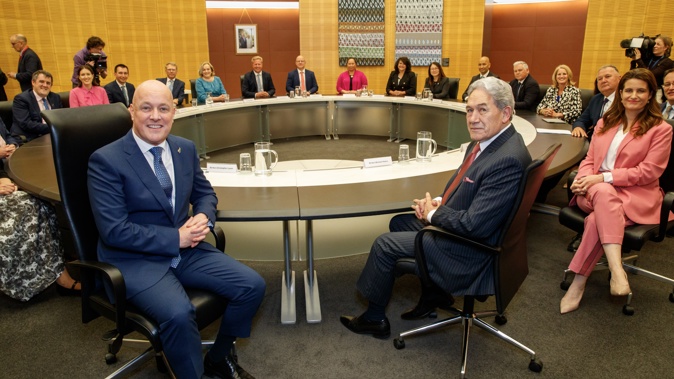
The new Government’s first Cabinet meeting got off to a tense start as Deputy Prime Minister Winston Peters again accused the media of taking bribes, while Prime Minister Christopher Luxon tried to normalise proceedings by cracking jokes about the roundness of the Beehive.
The new Government sat down to its first Cabinet meeting on the 10th floor of the Beehive at 1pm today. As is tradition, media were invited into the room to record some opening remarks and take a photo of the new Cabinet.
Luxon opened proceedings by joking about Cabinet confidentiality. When asked about what the meeting would discuss, Luxon said, “that stays in this room”.
“We’ve got the team here, they went through induction this morning. They’re ready to go,” he said.
Luxon was asked about Peters’ attacks on the media made at Government House yesterday in which he accused the $55 million Public Interest Journalism Fund, a Labour Government initiative, of being a bribe to the media sector.
/cloudfront-ap-southeast-2.images.arcpublishing.com/nzme/LBQVALBZWRF3TDG6JEYEAKDF74.jpg)
The new Government sat down to its first Cabinet meeting on the 10th floor of the Beehive at 1pm today. Photo / Mark Mitchell
The Public Interest Journalism Fund (PIJF) supported discrete media projects, such as episodes of The Detail podcast, and temporarily funded certain jobs within the media sector, including local democracy reporters, who covered mainly local government in regional New Zealand. NZME, publisher of The Herald, received money from the fund for both projects and to fund roles like local democracy reporters.
“Didn’t see those comments, but I’m excited to get to work with this team here and get things done for New Zealand,” Luxon said.
Asked about the Cabinet Room’s extreme and disorienting roundness, Luxon joked, “the whole building is round mate”.
Peters interjected as Luxon ushered for media to leave and proceedings to get under way.
“Before you go - can you possibly tell the public what you had to sign up to to get the money, it’s called transparency,” Peters said.
Luxon was asked about those comments but did not respond. Fellow Cabinet ministers shuffled awkwardly in their seats.
Peters’ attack on the fund is tied to his criticism of the use of te reo Māori in the media.
“Well, we’ll see the speed at which TVNZ and RNZ - which are taxpayer-owned - understand this new message. We’ll see whether these people, both the media and journalists - are they independent? Well, isn’t that fascinating, I haven’t seen evidence of that in the last three years,” Peters said at Government House yesterday.
“You can’t defend $55 million of bribery, cannot defend $55 million of bribery. Get it very clear,” Peters said.
Act leader David Seymour later said on Newstalk ZB that he did not necessarily think Peters had stolen all the thunder from the Cabinet photo op.
Seymour said the PIJF had led to the perception that it distorted media coverage.
He said he personally did not believe the media had been distorted by it, saying $55m over two years was a very small proportion of overall media revenue and journalists guarded their independence strongly.
“The idea that all the journalists in New Zealand were corrupted by 2 per cent of revenue to me doesn’t pass the sniff test. But it certainly has created a widespread perception. I’ve heard it many, many times and I think Winston Peters is reflecting what, no doubt, many people have said to him as well as to me,” Seymour said.
He said it was “very silly policy... Probably the worse thing about it was that, whether or not you believe it’s true, for a lot of other people it created the perception that the media had been distorted by public money and the conditions that came with it”.
“We need a free and independent press, especially one that is unafraid to hold the Government accountable and it should not be taking money from that same Government.”
Seymour said RNZ and TVNZ had been set up with safeguards for editorial independence, but the conditions attached to the PJIF, such as adhering to the principles of the Treaty of Waitangi, had made that problematic and led to distrust.
Applicants to the fund were asked that, when appropriate in producing funded content, to support NZ identity, culture and public interest requirements, including support for the principles of Te Tiriti o Waitangi.
However, overriding this in NZME’s funding agreements - a clause specifically requested by the company - is an acknowledgement of the absolute editorial independence of the media entity: “We acknowledge the importance of your editorial discretion as a media entity and confirm nothing in this Agreement will limit or in any way impede or influence the ability of your news reporting functions to report and comment on news stories and current events, including those involving us, as you see fit.”
Take your Radio, Podcasts and Music with you









